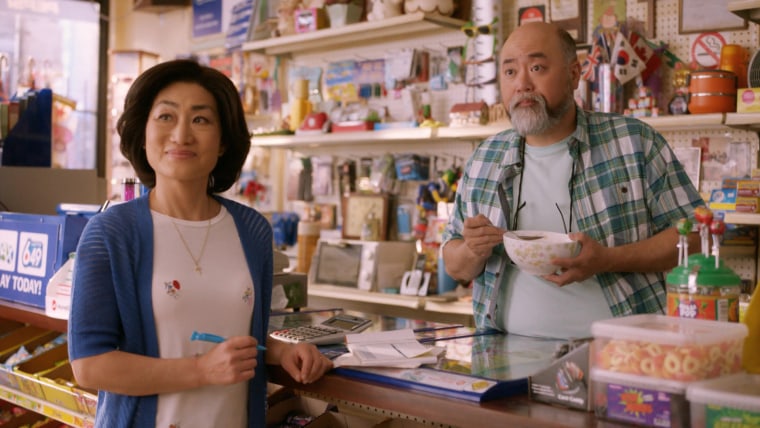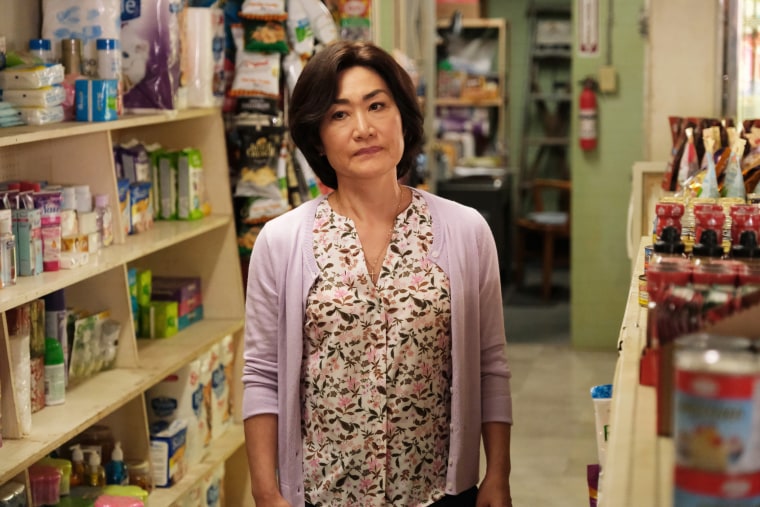In a memorable episode from the first season of "Kim’s Convenience," the hit Canadian sitcom about a Korean immigrant family running a corner store, two characters got food poisoning after eating galbijjim, or braised short ribs.
The scene, which prompted numerous Canadian papers to publish galbijjim recipes, helped the show win critical acclaim for its intimate, authentic exploration of Korean culture and food on television. But star Jean Yoon, who played the matriarch, Umma, said the original script included a glaring error.
“The original dish they had was kimchi,” Yoon said in an interview a month after the show aired its fifth and final season on Netflix. “I had to explain ... that because kimchi is fermented ... it’s prepared in a way to fend off any bacteria. It is probiotic, anti-bacterial and acidic, so the only way that it could possibly make you sick is if it were poisoned. That’s why we changed it to a meat dish.”
The moment is indicative of systemic issues that plagued "Kim’s Convenience" throughout its half-decade run, which ended in a storm of controversy in early June when numerous cast members shared details about a toxic work environment.
In a since-deleted Facebook post, Simu Liu, who played Jung, alleged that the show’s mostly white writers refused to accept creative input from the core Asian cast members, who he said were paid a “horsepoop rate.”
But the more explosive missive came from Yoon. In a barrage of tweets last month, she ripped the show’s “overtly racist” and “extremely culturally inaccurate” storylines in later seasons, including her character’s diagnosis with multiple sclerosis, a disease that very few Koreans get. (“You are 5x more likely to get a blood clot from the AZ vaccine than you are to get MS if you're Korean,” she wrote.)

By pulling back the curtain on the production of the show — which was abruptly canceled after the departure of co-creators Ins Choi and Kevin White — Yoon, 59, exposed the chasm between on-screen representation and creative authority for Asians in the entertainment industry.
“As an Asian Canadian woman, a Korean-Canadian woman w more experience and knowledge of the world of my characters,” she tweeted, “the lack of Asian female, especially Korean writers in the writers room of Kims made my life VERY DIFFICULT & the experience of working on the show painful.”
In her first interview since the show ended, Yoon spoke about the behind-the-scenes racism she endured and the complicated legacy of "Kim’s Convenience." The conversation has been edited for length and clarity. (Thunderbird Entertainment, the production company behind "Kim’s Convenience," did not respond to a request for comment about Yoon’s claims.)
NBC Asian America: Your Twitter thread was in response to an op-ed by Canadian critic John Doyle, who criticized Simu Liu’s Facebook post as “unfair” and “mean-spirited.” Why did you feel compelled to share your experience on the show?
Yoon: There’s never been a doubt in my mind that I was going to try and take some of the things we learned from "Kim’s Convenience" and put it into a form to help our industry navigate better and more constructively. I was planning on writing about it in a longer, more thoughtful format for a film audience instead of a fan audience. But when John Doyle attacked Simu the way he did, I just couldn’t be quiet anymore. The way his op-ed was framed was that Simu was a difficult, immature actor and therefore everything he said is nonsense. The idea that “actors are not stewards of their characters” really bothered me. Some of us have been attached to the show since 2011. To dismiss our input was offensive to me.
What were some of the dynamics off screen?
Yoon: The show started out so well. We really thought we had found the balance of collaboration between a team with original stories and a specific cultural context and a well-established producing team. But as the show continued, the power shifted. Sometime in Season 4, it was very clear that while Ins and Kevin created the show together, Kevin was the showrunner. This became a crisis in the summer of 2020, so at the last minute, Ins was tasked with taking on the role of showrunner to revise and complete Season 5. Kevin remained. The cast learned that Ins was ready to leave after we finished principal shooting. No one knows why Ins decided to walk away, but his leaving was a huge blow to the moral authority of the show. The big lesson here is that "Kim’s Convenience" is a sitcom with Korean characters. There are things Koreans do and things that Koreans don’t do. There are prevailing values that are very important to our community.
What kind of changes were you and the cast pushing for?
Yoon: We wanted a Korean female writer urgently. That’s important, because the maxim is “write what you know.” But gender parity had eroded by Seasons 4 and 5, and we never got to 50-50 with BIPOC [Black, Indigenous and people of color] parity. Where I felt a female voice was lacking most was in Janet’s arc and in her interactions with Umma. Since the end of Season 1, all of us have been requesting to meet with writers. That never happened. For whatever reason, they didn’t engage with the cast. We wouldn’t even get the scripts until a week and a half before principal shooting. It was as if the Asian actors were somehow going to interfere with the genius of the writing room.
I thought there would be opportunities for the cast to direct and write some episodes. We all have writing experience. I’m formerly a playwright. We would have jumped at the chance to direct and write. But those opportunities never opened up.
Why did you have such a strong emotional investment in this role?
Yoon: My portrayal of Mrs. Kim is based on a lifetime of observations of my mother, my grandmother, my aunties and all these Korean women I’ve met in my travels. I would at some points visualize and channel them, basically asking for their blessings. When you’ve invested that much in your character and when you’re performing a script that you know it’s right, it’s such a visceral feeling. When you’re not listened to and feel stuck, you feel like a sock puppet. But we all worked hard to infuse every scene with as much true emotion as possible, because we recognized the show’s value to those of us who wanted to see any type of Asian representation that’s overall positive.
You tweeted that “all the Korean food in the show would have been wrong” if you hadn’t spoken up. Is there anything in particular?
Yoon: In Season 1, there was an episode in which Umma and Jung were cooking a church fair potluck. The dish I brought out is galbijjim, which made Janet and Appa sick. The original dish they had was kimchi. I had to explain to Ins and Kevin that because kimchi is fermented with so much garlic and red pepper, it’s prepared in a way to fend off any bacteria. It is probiotic, antibacterial and acidic, so the only way that it could possibly make you sick is if it were poisoned. That’s why we changed it to a meat dish. Also, kimchi is so central to Korean culture and survival, if a Korean woman made kimchi that made everybody sick, she would be shunned — forever.
Shortly after the Atlanta-area spa shootings in March, you tweeted that you wished the show had more directly and regularly addressed the bigotry and violence that diasporic Asians face. What would you have liked to see?
Yoon: I feel personally sad at the missed opportunities to share with our audiences what anti-Asian racism looks and feels like and the impact that it has on us. Here in Canada, racism is largely understood in terms of exclusion and minimization as opposed to overt attacks. But systemic racism is very pervasive. I would have loved to see Appa and Umma as heroes in some anti-Asian storyline that taps into the way our parents found humane, assertive responses to racism.
You said you wanted to share your ordeal to help the entertainment industry better navigate diversity issues. What can the gatekeepers of the industry learn from "Kim’s Convenience"?
Yoon: The big lesson for me is that you cannot do a show about a minority experience, have it run by a white person and expect it to be OK. Sometimes the white mainstream thinks when we ask for equity, we just want the jobs. But this affects the intrinsic moral values of the work we do. A lack of respect for a culture manifests as systemic racism.
